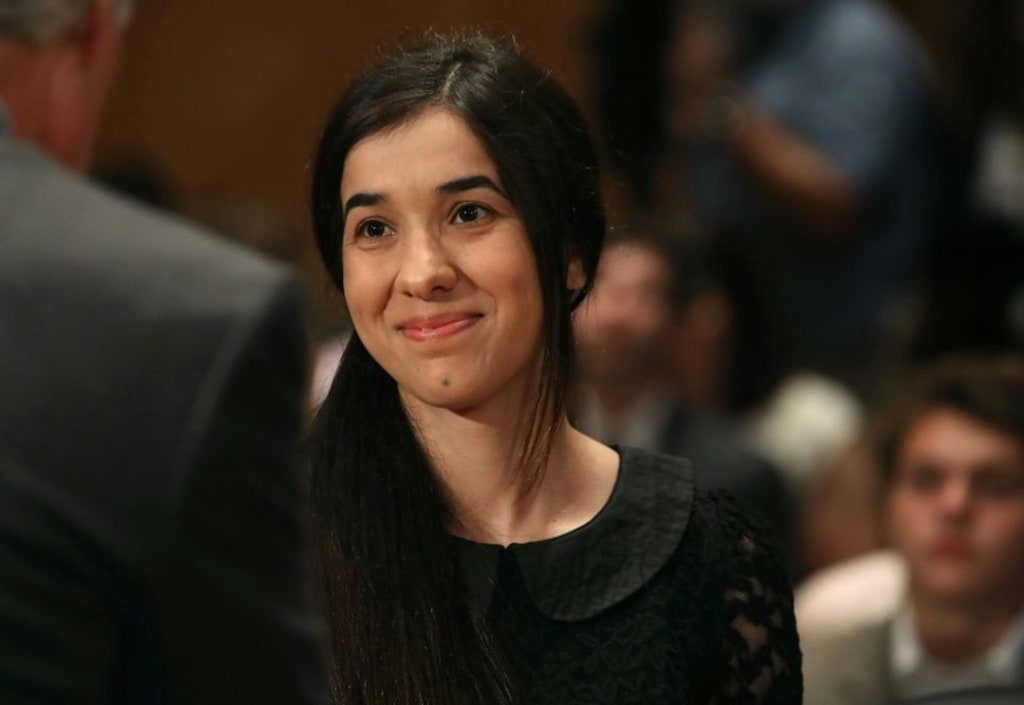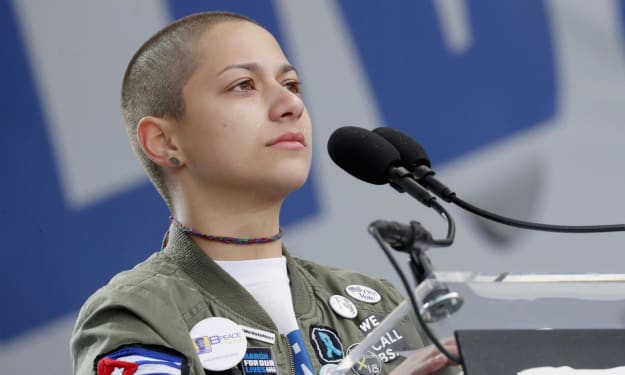Nadia Murad: A Beacon of Hope and Resilience
by David Pieringer

Nadia Murad: A Beacon of Hope and Resilience
Nadia Murad, born in 1993 in the small village of Kocho in northern Iraq, is a survivor of unspeakable atrocities and a formidable advocate for human rights. Her journey from a peaceful childhood to becoming a Nobel Peace Prize laureate is both heartbreaking and inspiring. Nadia's story is a testament to the resilience of the human spirit and the relentless pursuit of justice. This article delves into her life, the horrors she endured, and her tireless efforts to bring justice and hope to victims of genocide and sexual violence.
Early Life in Kocho
Nadia Murad grew up in Kocho, a village in the Sinjar District of northern Iraq. Kocho is home to the Yazidi community, an ethno-religious minority with a rich cultural heritage that dates back thousands of years. The Yazidis have often been persecuted for their beliefs, which combine elements of Zoroastrianism, Islam, Christianity, and other ancient religions.
Nadia's early life was filled with the simple joys of rural living. She was one of eleven children in a loving and close-knit family. Like many young girls, she dreamt of becoming a teacher or opening her own beauty salon. However, her dreams were shattered in August 2014 when the Islamic State of Iraq and Syria (ISIS) launched a brutal attack on Sinjar.
The Yazidi Genocide
The ISIS invasion of Sinjar marked the beginning of a horrific chapter in Nadia's life and in the history of the Yazidi people. The terrorist group aimed to exterminate the Yazidis, whom they viewed as infidels. Men were killed en masse, and women and children were subjected to unspeakable violence and enslavement.
On August 15, 2014, ISIS fighters surrounded Kocho, giving the villagers an ultimatum: convert to Islam or face death. When the villagers refused, ISIS executed hundreds of men, including six of Nadia's brothers and her mother. The women and children were taken captive. Nadia, then just 21 years old, was among them.
Captivity and Escape
Nadia was taken to Mosul, where she was held captive and subjected to severe physical and sexual abuse. She was forced into sexual slavery, a fate shared by thousands of Yazidi women and girls. The psychological and physical torment she endured was unimaginable.
Despite the constant threat of death, Nadia never lost hope. After three months of captivity, she managed to escape with the help of a Muslim family in Mosul who risked their lives to help her. They provided her with false identification papers, allowing her to flee ISIS-controlled territory. Eventually, she made her way to a refugee camp in Duhok, northern Iraq.
Advocacy and Recognition
Nadia's ordeal did not end with her escape. She decided to speak out about the atrocities committed against her and her people. Her courage in sharing her story brought international attention to the plight of the Yazidis and the horrific realities of sexual violence in conflict zones.
In 2015, Nadia was named a United Nations Goodwill Ambassador for the Dignity of Survivors of Human Trafficking. She began to travel the world, meeting with world leaders, speaking at international forums, and tirelessly advocating for the Yazidi community and other victims of sexual violence. Her memoir, "The Last Girl: My Story of Captivity, and My Fight Against the Islamic State," published in 2017, became a powerful tool in her advocacy work.
Nobel Peace Prize
In recognition of her extraordinary efforts, Nadia Murad was awarded the Nobel Peace Prize in 2018, alongside Dr. Denis Mukwege, a Congolese gynecologist who has dedicated his life to treating survivors of sexual violence. The Nobel Committee highlighted their efforts to end the use of sexual violence as a weapon of war and armed conflict.
Receiving the Nobel Peace Prize brought even more attention to Nadia's cause. She used the platform to call for justice and accountability for ISIS members and to advocate for the reconstruction of Yazidi communities. Nadia has consistently emphasized the importance of recognizing the Yazidi genocide and taking concrete steps to prevent such atrocities in the future.
The Nadia Murad Initiative
Nadia Murad co-founded Nadia's Initiative in 2016, a non-profit organization dedicated to helping victims of genocide and human trafficking. The initiative focuses on advocating for survivors, providing them with the support they need to rebuild their lives, and ensuring that the world does not forget the atrocities committed against them.
One of the key projects of Nadia's Initiative is the redevelopment of Sinjar. The organization works on rebuilding infrastructure, providing healthcare, and ensuring access to education for the Yazidi community. These efforts are crucial in helping survivors return to their homeland and regain a sense of normalcy.
Advocacy for Justice and Accountability
Nadia Murad's advocacy extends beyond humanitarian aid. She has been a vocal proponent of justice for the crimes committed by ISIS. She has called for the establishment of an international tribunal to prosecute ISIS members for genocide and crimes against humanity. Nadia believes that holding perpetrators accountable is essential for healing and preventing future atrocities.
In 2018, the United Nations Security Council adopted Resolution 2379, which established an investigative team to collect evidence of ISIS crimes in Iraq. This was a significant step towards justice, and Nadia's relentless advocacy played a crucial role in bringing about this resolution.
Global Impact and Continued Advocacy
Nadia Murad's impact extends far beyond the Yazidi community. Her advocacy has brought global attention to the issues of sexual violence, human trafficking, and the plight of ethnic and religious minorities in conflict zones. She has inspired countless individuals and organizations to take action against these injustices.
In addition to her work with Nadia's Initiative, Nadia has collaborated with various international organizations, governments, and advocacy groups. She has addressed the United Nations, the European Parliament, and numerous other international bodies. Her message is clear: the world must not turn a blind eye to the suffering of victims of genocide and sexual violence.
Personal Resilience and Legacy
Nadia Murad's story is one of incredible resilience and strength. Despite the unimaginable horrors she endured, she has emerged as a powerful voice for justice and human rights. Her unwavering determination to seek justice for her people and to prevent future atrocities is a testament to her character and courage.
Nadia's legacy is not only in the awards and recognitions she has received but in the tangible impact she has made on the lives of countless survivors. Through her advocacy and the work of Nadia's Initiative, she has provided hope and support to those who have suffered immensely. Her story serves as a reminder of the strength of the human spirit and the importance of standing up against injustice.
Conclusion
Nadia Murad's journey from a small village in northern Iraq to the global stage is a remarkable story of survival, resilience, and advocacy. Her courage in speaking out about the atrocities committed against her and her people has brought international attention to the plight of the Yazidis and the horrors of sexual violence in conflict zones. Through her work with Nadia's Initiative and her relentless pursuit of justice, Nadia has become a beacon of hope for survivors of genocide and human trafficking around the world.
Her legacy is a powerful reminder that even in the face of unimaginable suffering, the human spirit can endure and triumph. Nadia Murad's story is not just one of survival; it is a testament to the strength, resilience, and indomitable will of a woman who has turned her pain into a force for change. As she continues to advocate for justice and support for survivors, Nadia's impact on the world will undoubtedly be felt for generations to come.
About the Creator
David Pieringer
Welcome to my page! I'm a dedicated writer and student with a passion for both education and sports. Balancing my love for learning with my athletic pursuits, I strive to excel in everything I do.
Enjoyed the story? Support the Creator.
Subscribe for free to receive all their stories in your feed. You could also pledge your support or give them a one-off tip, letting them know you appreciate their work.






Comments
There are no comments for this story
Be the first to respond and start the conversation.